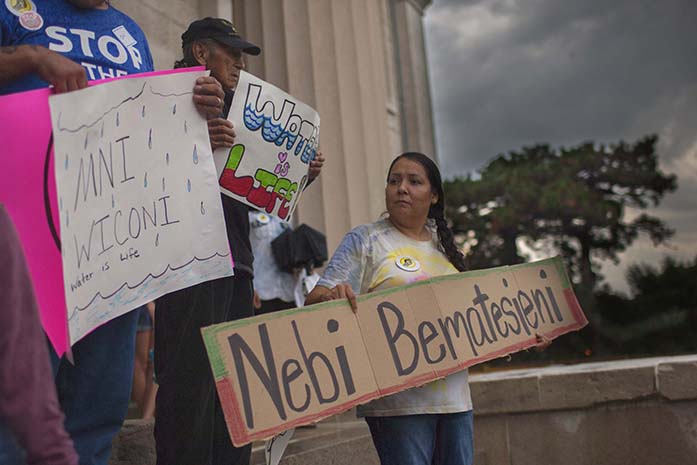Activists gathered on the Pentacrest Thursday to protest the Dakota Access Pipeline.
By Katelyn Weisbrod
Rain and thunder did nothing to stop protesters of the Dakota Access Pipeline from gathering on the Pentacrest on Thursday.
It even contributed to their message: Water is Life.
Members of the University of Iowa Native American Student Association organized the group of approximately 100 people of varying ages and ethnicities to protest the pipeline, which could negatively affect the environment.
“I’m glad it’s raining,” co-head of the Native American Association Dawson Davenport said in a speech to the protesters. “Water is life.”
The pipeline construction, which is on hold, would run from the Bakken Oil Fields of North Dakota diagonally through South Dakota, Iowa, and Illinois, where it would connect with an existing pipeline. The pipeline is owned by Energy Transfer Partners, and it is anticipated to be completed this year pending “regulatory approvals,” according to its website.
Speakers at Thursday’s protest included Native Americans, farmers, environmentalists, and others from around the state of Iowa.
“This isn’t a fight that Indians are doing for ourselves, it’s for everybody,” Davenport said, who is a member of the Sac and Fox of the Mississippi tribe in Iowa. “That’s something that we’ve always been about; we’re not just in it for ourselves, we’re in it for every human on this planet.”
If the pipeline were to burst, it could pollute Iowa’s rivers, lakes, and groundwater.
“What nobody understands is that water is life, and it’s important,” Donnielle Wanatee, a member of Sac and Fox of the Mississippi tribe told the crowd of protesters. “Water grows everything; in this great state of Iowa, it grows minds, it grows our children, it grows our crops, it grows our trees.”
The protest ended early because of lightning, and another protest was scheduled for October. Davenport said he hoped the protest increased awareness and educated people about the dangers of the pipeline.
“[I want to] get people here to support the Iowa effort to stop this pipeline,” he said. “I really just want to bring as much awareness as I can to the issue and hopefully put a stop to them building this pipeline.”

However, UI Associate Professor of history and geography Tyler Priest said he does not believe there’s much of a chance that the pipeline can be stopped. Some of his research has focused on oil and gas production.
Priest said although there is a risk of a leak with any pipeline, the likelihood of that happening in this new, state-of-the-art pipeline is negligible.
“I can’t define for [Native Americans] what risk is, and their concerns are legitimate,” he said. “But from my own perspective, pipelines are safe, and they’re necessary.”
One of the biggest concerns to Davenport and the Sac and Fox of the Mississippi tribe is the potential damage to the Mississippi River.
“We have a connection to the Mississippi River I think that needs to be honored by us because it took care of us at one point in our history, and we need to return that favor now by not letting this pipeline go through,” he said.
Davenport said he believes the ideal alternative to building the pipeline is to focus on development of green energy.
Priest, however, said that stopping this pipeline in attempt to reduce the supply of oil would not work, because the demand of oil will not stop.
“You can stop the pipeline, but that doesn’t mean we’re going to stop consuming oil, as much as people would like to see that happen,” Priest said. “Stopping the pipeline doesn’t mean we’ll be instantly replacing that oil with wind and solar; most likely it will be imported from the Canadian oil sands.”
Those sands, Priest said, produce a much more “heavy, sludgy” oil, which if spilled would be much more difficult to clean up than the “light, sweet, volatile” oil of the Bakken.
Nevertheless, activists will continue to fight to halt this pipeline.



